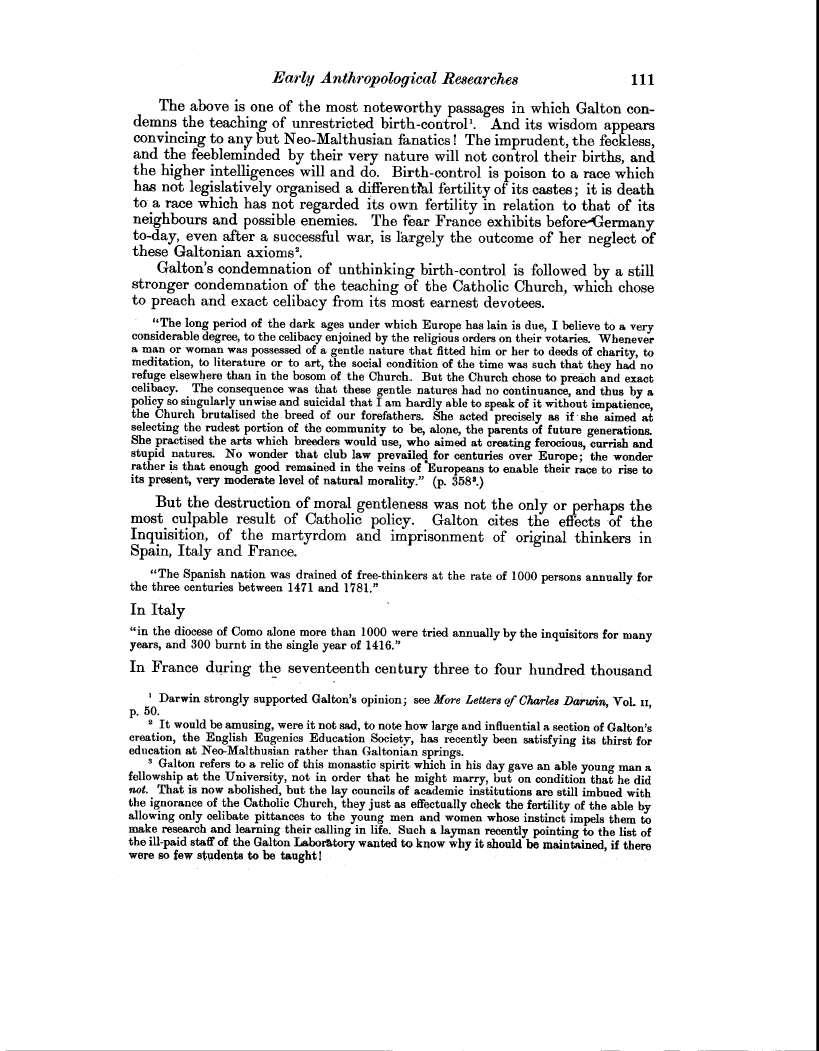Early Anthropological Researches 111
The above is one of the most noteworthy passages in which Galton condemns the teaching of unrestricted birth-control'. And its wisdom appears convincing to any but Neo-Malthusian fanatics ! The imprudent, the feckless, and the feebleminded by their very nature will not control their births, and the higher intelligences will and do. Birth-control is poison to a race which has not legislatively organised a differential fertility of its castes; it is death to a race which has not regarded its own fertility in relation to that of its neighbours and possible enemies. The fear France exhibits before-Germany to-day, even after a successful war, is largely the outcome of her neglect of these Galtonian axioms2.
Galton's condemnation of unthinking birth-control is followed by a still stronger condemnation of the teaching of the Catholic Church, which chose to preach and exact celibacy from its most earnest devotees.
"The long period of the dark ages under which Europe has lain is due, I believe to a very considerable degree, to the celibacy enjoined by the religious orders on their votaries. Whenever a man or woman was possessed of a gentle nature that fitted him or her to deeds of charity, to meditation, to literature or to art, the social condition of the time was such that they had no refuge elsewhere than in the bosom of the Church. But the Church chose to preach and exact celibacy. The consequence was that these gentle natures had no continuance, and thus by a policy so singularly unwise and suicidal that I am hardly able to speak of it without impatience, the Church brutalised the breed of our forefathers. She acted precisely as if she aimed at selecting the rudest portion of the community to be, alone, the parents of future generations. She practised the arts which breeders would use, who aimed at creating ferocious, currish and stupid natures. No wonder that club law prevailed for centuries over Europe; the wonder rather is that enough good remained in the veins of Europeans to enable their race to rise to its present, very moderate level of natural morality." (p. 358'.)
But the destruction of moral gentleness was not the only or perhaps the most culpable result of Catholic policy. Galton cites the effects of the Inquisition, of the martyrdom and imprisonment of original thinkers in Spain, Italy and France.
"The Spanish nation was drained of free-thinkers at the rate of 1000 persons annually for the three centuries between 1471 and 1781."
In Italy
"in the diocese of Como alone more than 1000 were tried annually by the inquisitors for many years, and 300 burnt in the single year of 1416."
In France during the seventeenth century three to four hundred thousand
' Darwin strongly supported Galton's opinion; see More Letters of Charles Darwin, Vol- ii, p. 50.
2 It would be amusing, were it not sad, to note how large and influential a section of Galton's creation, the English Eugenics Education Society, has recently been satisfying its thirst for education at Neo-Malthusian rather than Galtonian springs.
3 Galton refers to a relic of this monastic spirit which in his day gave an able young man a fellowship at the University, not in order that he might marry, but on condition that he did not. That is now abolished, but the lay councils of academic institutions are still imbued with the ignorance of the Catholic Church, they just as effectually check the fertility of the able by allowing only celibate pittances to the young men and women whose instinct impels them to make research and learning their calling in life. Such a layman recently pointing to the list of the ill-paid staff of the Galton Laboratory wanted to know why it should be maintained, if there were so few students to be taught!

